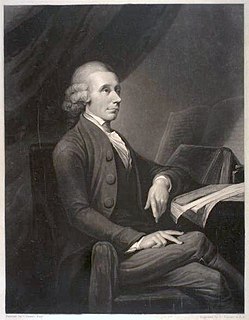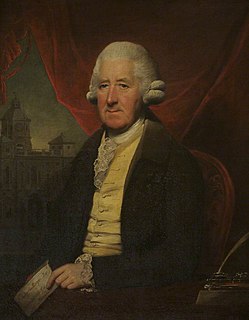Works
As an antiquary devoted to heraldic study, Bossewell was a close follower of Gerard Legh. The first edition of his Workes of Armorie was published by Richard Totell in 1572, with a reprint in 1597. The first part, entitled "Concordes", is an abridgement of Legh's Accedens of Armory. Like Legh, he covered symbolism and allegory, conceits and fables. [2]
Junius was the pseudonym of a writer who contributed a series of political letters critical of the government of King George III to the Public Advertiser, from 21 January 1769 to 21 January 1772 as well as several other London newspapers such as the London Evening Post.

Walter Ramsden Hawkesworth Fawkes was a Yorkshire landowner, writer and Member of Parliament (MP) for Yorkshire from 1806 to 1807.
John Burke was an Irish genealogist, and the original publisher of Burke's Peerage. He was the father of Sir Bernard Burke, a British officer of arms and genealogist.

The Theological Repository was a periodical founded and edited from 1769 to 1771 by the eighteenth-century British polymath Joseph Priestley. Although ostensibly committed to the open and rational inquiry of theological questions, the journal became a mouthpiece for Dissenting, particularly Unitarian and Arian, doctrines.
The Lady Margaret Professorship of Divinity is a senior professorship in Christ Church of the University of Oxford. The professorship was founded from the benefaction of Lady Margaret Beaufort (1443–1509), mother of Henry VII. Its holders were all priests until 2015, when Carol Harrison, a lay theologian, was appointed to the chair.

Sir Job Charlton, 1st Baronet KS was an English judge and politician who sat in the House of Commons between 1659 and 1679. He was Speaker of the House of Commons of England briefly in 1673.
John Christmas Beckwith was an English organist and composer.
James Blount, 6th Baron Mountjoy was an English peer.
John Bright (1783–1870) was an English physician.

Ambrose Eccles, full name Isaac-Ambrose Eccles, was an Irish Shakespearean scholar.
George Wilmot Bonner was a British wood-engraver.
The parliamentary visitation of the University of Oxford was a political and religious purge taking place from 1647, for a number of years. Many Masters and Fellows of Colleges lost their positions.
John Bonar (1721–1761) was a Church of Scotland minister.

Sir Charles Gould Morgan, 1st Baronet was an English Judge Advocate-General. From his birth until 1792 he was known as Charles Gould.
Miles Bland was an English cleric and mathematician.

William Henry Blaauw (1793–1870) was an English antiquarian and historian, particularly active in Sussex.
Jonathan Blewitt was an English organist, composer of light operas and songs, and a musical director.
William Boscawen (1752–1811) was an English barrister, author and translator.
This page is based on this
Wikipedia article Text is available under the
CC BY-SA 4.0 license; additional terms may apply.
Images, videos and audio are available under their respective licenses.
![]() This article incorporates text from a publication now in the public domain : Stephen, Leslie, ed. (1886). "Bossewell, John". Dictionary of National Biography . Vol. 5. London: Smith, Elder & Co.
This article incorporates text from a publication now in the public domain : Stephen, Leslie, ed. (1886). "Bossewell, John". Dictionary of National Biography . Vol. 5. London: Smith, Elder & Co.




